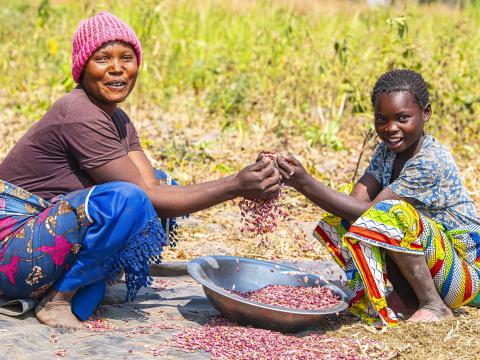DR Congo: Growing Beans Guarantees Food Security For The Communities And Children Of Fungurume

By Tatiana Ballay - Communications Officer
In this mining region of Lualaba, several local farmers' associations are helping to develop agriculture. 16 groups are receiving support from World Vision, in partnership with the Association des Jeunes pour le Developpement Social et Durable (AJDSD), with technical assistance from agronomy inspectors from the Fungurume commune. This support has led to a significant improvement in production, particularly of beans, a staple food for many families.
Since 2023, training courses focusing on agricultural techniques have enabled these associations to make better use of their resources. These courses, known as Farmer Field Schools (FFS), have introduced new sowing methods, soil management, and the use of inputs, all of which have led to a significant improvement in crop yields.
Thanks to training at Farmer Field Schools (FFS), these yields have reached 1,300 kg per hectare, directly benefiting 48 households. Between 2023 and 2024, 16 local associations farmed 20 hectares of land, producing around 26 tones of beans. This increase in yields not only improves the food security of families but also benefits 132 vulnerable children cared for by the associations.
In the fields of the Umoja association in Shonongo, Jeros Kibwe, president of AJDSD and an agricultural engineer, explains that the harvest will be enormous. He notes that the average number of pods per stem is 26, with around six seeds per pod, indicating high yields.
A competitive local market
Local beans in Fungurume are sold at 8,000 Congolese francs (CF) for a 2.5kg bucket, compared with 10,000 CF for imported beans, offering an economic advantage for low-income families and boosting the local economy. According to Ngoy, agronomist for the commune of Fungurume, World Vision's support has helped improve yields.
Positive testimonials
Members of local associations testify to the significant changes that growing beans has brought to their lives. Anaclet, a member of the CODI association, shares his feelings in moderation:
‘This season, we've had a bigger harvest than usual. This means we can not only sell some of the harvest but also ensure that it is better distributed among the families.’
Chantal, president of the Neema association, sees gradual improvements: ‘Since we have been receiving support from World Vision, we have seen an evolution in our harvests. It's not a sudden change, but gradually it's helping to improve the food security in our families.’
For her part, Kazadi, president of the UMOJA association, points to a quantifiable impact:
‘Before we received the training, we harvested around 200 buckets of beans. This year, we have reached 560 buckets. If we continue to apply what we've learned, we could double that again next year.’
Before the intervention of World Vision and its partners, local farmers were harvesting an average of 500 kg of beans per hectare.
Despite the environmental challenges associated with mining activities, local associations continue to make progress thanks to regular training and monitoring by local experts. These efforts are part of a sustainable approach aimed at strengthening the resilience of rural communities and improving food security in the region.
Contributing to the objectives of the Enough campaign
World Vision's Enough campaign supports sustainable agriculture to strengthen the resilience of rural communities in the face of food crises. In Fungurume, support for farming associations has increased yields and made local production more accessible. Ongoing support is needed to sustain these achievements.